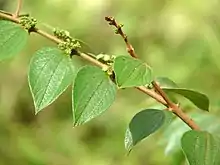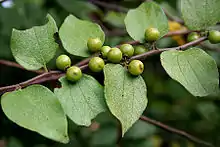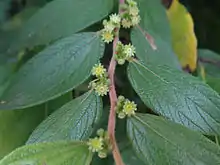Ziziphus oenopolia
Ziziphus oenopolia, commonly known as the jackal jujube, small-fruited jujube or wild jujube, is a flowering plant with a broad distribution through tropical and subtropical Asia and Australasia. In India, it is mostly found in the deciduous forests of the southern part of the country.
| Ziziphus oenopolia | |
|---|---|
 | |
| Ziziphus oenopolia | |
| Scientific classification | |
| Kingdom: | Plantae |
| Clade: | Tracheophytes |
| Clade: | Angiosperms |
| Clade: | Eudicots |
| Clade: | Rosids |
| Order: | Rosales |
| Family: | Rhamnaceae |
| Genus: | Ziziphus |
| Species: | Z. oenopolia |
| Binomial name | |
| Ziziphus oenopolia | |
| Synonyms[1] | |
| |


Description
It is a spreading, sometimes climbing, thorny shrub growing to 1.5 m in height. The leaves are simple, alternate, ovate-lanceolate, acute and oblique. The flowers are green, in subsessile axillary cymes. The fruit is a globose drupe, black and shiny when ripe, containing a single seed.[2]
Distribution and habitat
It ranges from the Indian subcontinent through southern China and Southeast Asia to northern Australia. It grows along roadside forests and thickets.[3]
Uses
The berries are edible and the bark is used for tanning.[3]
Medicinal
The plant produces cyclopeptide alkaloids known as ziziphines and has a long history of use as an herbal medicine. In India, the root is used in Ayurvedic medicine.[2] The Konkani people of Maharashtra use the chewed leaves as a dressing for wounds.[4] In Burma the stem bark is used as a mouthwash for sore throats, for dysentery, and for inflammation of the uterus.[5] Research in Thailand has found that extracts of ziziphine from Ziziphus oenopolia show antiplasmodial in vitro activity against the malarial parasite Plasmodium falciparum.[6]
References
- The Plant List: A Working List of All Plant Species, retrieved 30 January 2016
- Ayurvedic medicinal plants.
- Ara et al. (2008).
- Kuvar & Bapat (2010).
- Myanmar Medicinal Plant Database.
- Sunit Suksamrarn et al. (2005).
Sources
- Ara, Hosne; Hassan, Md. Abul & Khanam, Mahbuba (June 2008). "Taxonomic study of the genus Ziziphus Mill. (Rhamnaceae) of Bangladesh". Bangladesh Journal of Plant Taxonomy. 15 (1): 47–61. doi:10.3329/bjpt.v15i1.917.
- Kuvar, Sachin D. & Bapat, U.C. (2010). "Medicinal plants used by Kokani tribals of Nasik district Maharashtra to cure cuts and wounds" (PDF). Indian Journal of Traditional Knowledge. 9 (1): 114–115.
- Sunit Suksamrarn; Narisara Suwannapoch; Natthachai Aunchai; Mayuso Kuno; Piniti Ratananukul; Rachada Haritakun; Chawewan Jansakul & Somsak Ruchirawat (January 2005). "Ziziphine N, O, P and Q, new antiplasmodial cyclopeptide alkaloids from Ziziphus oenoplia var. brunoniana". Tetrahedron. 61 (5): 1175–1180. doi:10.1016/j.tet.2004.11.053.
- "Ziziphus oenoplia ". Ayurvedic medicinal plants. Retrieved 2010-11-02.
- "Ziziphus oenopolia". Germplasm Resources Information Network. Agricultural Research Service, United States Department of Agriculture. Retrieved 2010-11-02.
- "Ziziphus oenoplia ". Myanmar Medicinal Plant Database. Retrieved 2010-11-02.
- "Ziziphus oenoplia ". Forestry Nepal. Retrieved 2015-11-10.